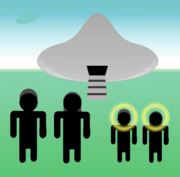Geniocracy
|
A series of articles on the |
|
 |
|
Founder • History
Beliefs & practices
Cloning (Clonaid)
Funds
Views on:
Politics
Economics
Cosmology
Geniocracy is the framework for a system of government which was first proposed by Raël (leader of the International Raëlian Movement) in 1977 and which advocates problem-solving and creative intelligence as criteria for governance.
The term geniocracy comes from the word genius, and describes a system that is designed to select for intelligence and compassion as the primary factors for governance. While having a democratic electoral apparatus, it differs from traditional liberal democracy by instead suggesting that candidates for office and the body electorate should meet a certain minimal criterion of problem-solving or creative intelligence. The thresholds proposed by the Raëlians are 50% above the mean for an electoral candidate and 10% above the mean for an elector.
This method of selectivity is deliberate so as to address what the concept considers to be flaws in the current systems of democracy. The primary object of criticism is the inability of majoritarian consensus to provide a reasonable platform for intelligent decision making for the purpose of solving problems permanently. Geniocracy's criticism of this system is that the institutions of democracy become more concerned with appealing to popular consensus through emotive issues than they are in making long-term critical decisions, especially those that may involve issues not immediately relevant to the electorate. It asserts that political mandate is something far too important to simply leave to popularity, and asserts that the critical decision making required for government, especially in a world of globalization, cannot be based on criteria of emotive or popular decision making. In this respect, Geniocracy derides Liberal Democracy as a form of "Mediocracy". In a geniocracy Earth would be ruled by a worldwide Geniocratic government.
...
Wikipedia
